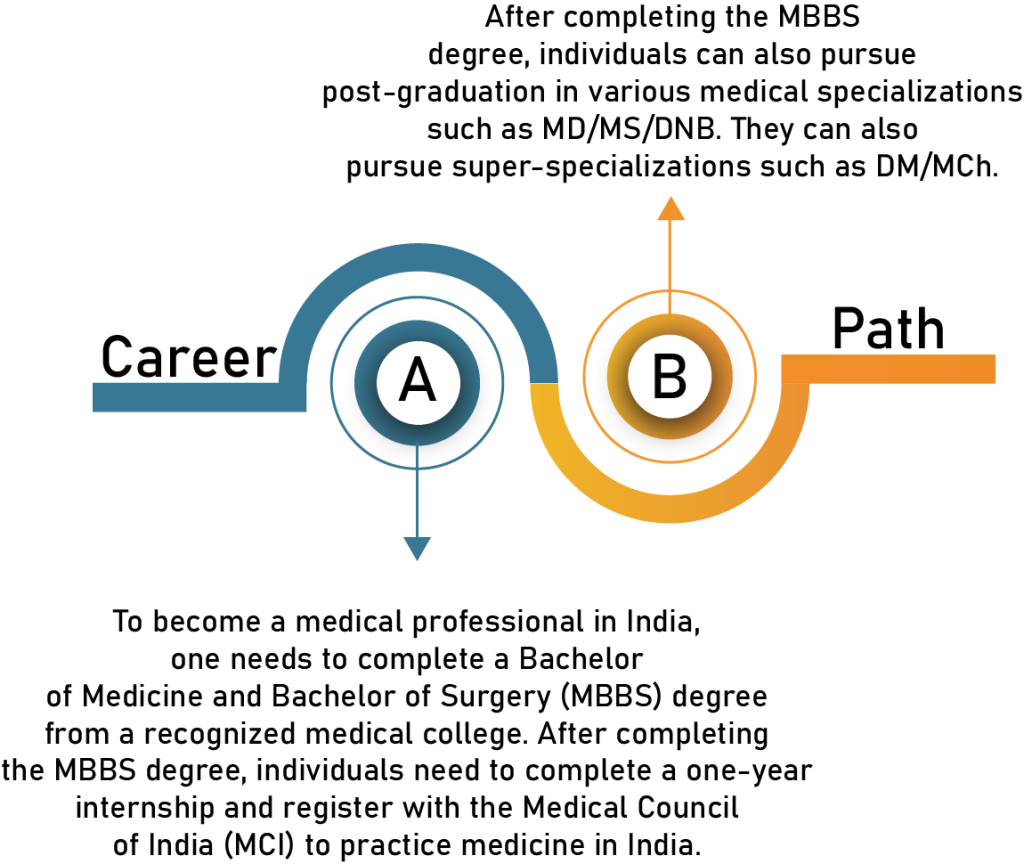Medicine is a highly respected and rewarding career. It offers individuals the opportunity to make a significant impact on people’s lives by diagnosing and treating illnesses, promoting health, and saving lives. The field of medicine is highly regulated, and there are stringent educational and licensing requirements for becoming a medical professional.

Work description
Medical professionals diagnose and treat patients with various illnesses and injuries. They may work in hospitals, clinics, or private practice settings. The work of a medical professional may include:
- Examining patients and taking medical histories to diagnose illnesses and injuries.
- Ordering and interpreting medical tests, such as X-rays, CT scans, and blood tests.
- Prescribing medications and other treatments.
- Providing counseling to patients and their families about managing illnesses and injuries.
- Performing medical procedures, such as surgeries or other interventions.
- Conducting research and clinical trials to advance medical knowledge and treatment options.
High Demand
Job Security
Lucrative salaries
High earning potential
Opportunities for innovation
Respect and prestige
Versatility
Opportunities for research and innovation
Flexibility
Personal fulfillment
High stress
Long training period
Long hours
High levels of stress and pressure
Competitive field
Risk of malpractice suits
Constant learning
Limited work-life balance
Isolation
High levels of responsibility
MBBS degree: The cost of pursuing an MBBS degree in India can range from ₹5 lakhs to ₹1 crore depending on the college and location. Private medical colleges charge higher fees than government medical colleges.
Post-Graduate degree: Pursuing a post-graduate medical degree, such as MD or MS, can cost between ₹10 lakhs to ₹80 lakhs depending on the college and location.
Additional expenses: Apart from tuition fees, there are other expenses such as accommodation, books, and living expenses, which can vary depending on the location and lifestyle.
[wpcharts type=”horizontalbarchart” bgcolor=”red:gray:yellow,blue:gray:yellow,random:gray:yellow,purple:gray:yellow” min=”0″ legend=”true” titles=”2 year , 5 year” values=”3,7,5,12″]
The expected salary of medical professionals in India varies based on their specialization and experience. As a fresher, doctors can expect a starting salary of around INR 6 to 10 lakhs per annum. The salary increases with experience and can go up to 15-20 lakhs of rupees or more per annum.
[wpcharts type=”horizontalbarchart” bgcolor=”red:gray:yellow,blue:gray:yellow,random:gray:yellow,purple:gray:yellow” min=”0″ legend=”false” titles=”Entry-Level, Mid-Career, Senior-Level ” values=”5,15,25,35,45,55″]
High level of dedication and commitment.
Strong Academic Ability
Critical Thinking Skills
Emotional Intelligence
Attention to Detail
Strong Adaptability
Poor in academics
Lack of Empathy
Poor Communication Skills
Difficulty with Critical Thinking
Inability to Manage Stress
Lack of Attention to Detail
Poor social skills
Work-life balance
Achieving a good work-life balance can be challenging for medical professionals. Medicine is a demanding field that requires a high level of dedication and commitment, which can make it difficult to find time for personal interests and relationships. Some factors that affects the work-life balance are:
- Long work hours.
- High levels of stress.
- On-call duties.
- Demanding patient care.
By setting boundaries, practicing self-care, prioritizing relationships, seeking support, and taking breaks, medical professionals can improve their work-life balance and lead fulfilling lives both inside and outside of work.

Ability to improve and save lives
Crucial role in diagnosing and treating illnesses, injuries, and chronic conditions
Promoting preventive healthcare practices to help patients maintain good health
Advancement in medical research and technology leading to the development of new treatments, cures, and preventive measures
Reduced overall burden of illness and disease
Improved quality of life and increased productivity
Cardiology
A specialization in the study of heart diseases and its treatment.
Gynecology
A specialization in the study of women’s reproductive systems and its treatment.
Neurology
A specialization in the study of the nervous system and its disorders.
Oncology
A specialization in the study of cancer and its treatment.
Urology
A specialization in the study of urinary tract system and the reproductive system.
Conclusion:
The career path of a medical professional is highly rewarding and offers many opportunities for growth and development. Experienced medical professionals can work in leadership roles in hospitals, medical colleges, and research organizations. They can also start their private practice and establish themselves as specialists in their field.



